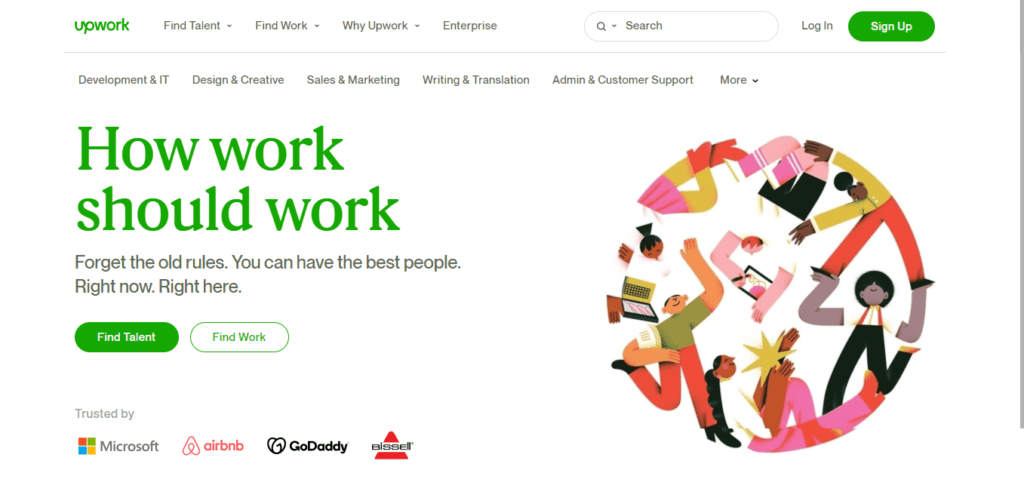The world of work is changing, and more and more people are turning to freelance work as a way to achieve their career goals and attain a better work-life balance. In fact, freelance made up 36% of the U.S. workforce in 2020, and the percentage is still growing. Freelancers enjoy the freedom of choosing their workload, projects, and clients, making it an attractive career choice for many.
The COVID-19 outbreak has also led to an increase in companies recruiting freelancers to cope with work demands. This has resulted in a larger number of available freelance jobs, ranging from grocery shoppers to web developers. However, with so many options available, finding quality freelance work can be a daunting task, even if you have already created an online portfolio.
If you’re a freelancer looking for work, you’re in luck. In this article, we’ll list the best freelance websites to help you find the work you’re looking for. These websites have been carefully selected based on their reputation, user base, and the quality of jobs available. So, whether you’re a writer, designer, programmer, or any other type of freelancer, these websites can help you connect with clients and find the work you need to achieve your career goals.
Table of Contents
What are the best freelance websites?
Here are our top 10 freelance websites to choose from:
3. Fiverr

Freelancing type: Digital Marketing, Web Development, Social Media
Pros: Diverse Category, Free Registration, Online Courses
Cons: High Commission Charge, Long Payment Process
Fiverr is a popular freelance website that connects businesses with freelancers offering services in various digital projects. The platform provides a simplified way for freelancers and business owners to interact and transact.
One of the main advantages of Fiverr is that it offers a diverse range of categories, including digital marketing, web development, and social media services. This provides freelancers with ample opportunities to showcase their skills and attract potential clients.
Another advantage of using Fiverr is that registration is free. This means that freelancers can create an account, list their gigs, and start applying for jobs without incurring any fees. Additionally, Fiverr offers online courses to help freelancers improve their skills and stay up to date with the latest trends and technologies.
However, one of the downsides of Fiverr is that it charges a high commission fee for every completed project. Freelancers only receive 80% of the offered price, with the rest going to Fiverr as a commission. Additionally, it can take up to 14 days for freelancers to withdraw their earnings, which can be a disadvantage for those who require fast access to their funds.
Despite these drawbacks, Fiverr offers access to a vast pool of potential clients, with over 3.42 million active buyers on the platform. Freelancers are also protected by an SSL certificate that ensures secure billing and personal information. Moreover, Fiverr provides around-the-clock customer support to assist freelancers with any issues or concerns.
2. Upwork

Freelancing type: web development, graphic design, writing, virtual assistance, and more.
Pros: large job pool, variety of project categories, robust payment system
Cons: high commission fees, competitive market, limited free proposals
Upwork is one of the largest freelance platforms with over 12 million registered freelancers and 5 million registered clients. Freelancers can create profiles highlighting their skills and experience, and submit proposals for job postings.
The platform offers a wide range of job categories, from web development to virtual assistance, and boasts of a large pool of job opportunities. Upwork also has a robust payment system that ensures safe and secure transactions for both clients and freelancers.
However, with a large pool of freelancers, the competition for jobs can be high. Additionally, Upwork charges a commission fee of up to 20% on freelancers’ earnings, which can eat into their profits. Freelancers are also limited to a certain number of free proposals per month, which can make it difficult for them to apply for more jobs.
3. Freelancer

Freelancing type: web development, mobile development, graphic design, writing, and more.
Pros: diverse job categories, no commission fees for basic plans, the option to take skills tests
Cons: a large pool of freelancers, limited free bids, transaction fees for payment processing
Freelancer is another popular freelance platform that offers a variety of job categories, from web development to graphic design. Freelancers can create profiles highlighting their skills and experience and submit proposals for job postings.
Freelancer offers a range of membership plans, including a basic free plan, which allows freelancers to bid on up to 8 jobs per month without any commission fees. Freelancers can also take skills tests to showcase their expertise in specific areas.
However, with over 50 million registered users, Freelancer has a large pool of freelancers, making it competitive to secure jobs. Freelancers are also limited to a certain number of free bids per month, and there are transaction fees for payment processing, which can add up over time.
4. Guru

Freelancing type: web development, design, writing, marketing, and more.
Pros: no commission fees for basic plans, diverse job categories, secure payment system
Cons: a smaller pool of job opportunities, limited free bids, the interface can be overwhelming
Guru is a freelance platform that offers a range of job categories, including web development, design, writing, and marketing. Freelancers can create profiles and submit proposals for job postings.
Guru offers a basic free plan that allows freelancers to bid on up to 10 jobs per month without any commission fees. The platform also has a secure payment system that ensures safe transactions for both clients and freelancers.
However, Guru has a smaller pool of job opportunities compared to other platforms, making it more difficult for freelancers to secure jobs. Freelancers are also limited to a certain number of free bids per month, and the interface can be overwhelming for some users.
5. Flexjobs

Freelancing type: Remote work, flexible jobs, telecommuting
Pros: High-quality job listings, vetted job opportunities, job search resources
Cons: Membership fee, limited free options
FlexJobs is a freelance website that caters to job seekers looking for remote and flexible work options. It offers job opportunities in various fields, including customer service, writing, editing, and project management.
FlexJobs stands out among other freelance websites because it is a subscription-based platform that focuses on quality job listings. It offers job search resources such as skills testing and resume reviews. Also, it has a team that verifies job postings to ensure they are legitimate and not scams.
However, there is a membership fee that starts at $6.95 per week. While there are limited free job listings, the majority of jobs require a subscription.
6. Toptal
Freelancing type: software development, design, finance.
Pros: Toptal is an exclusive freelancing platform that only accepts the top 3% of freelancers in their respective fields. This means that freelancers who are accepted onto the platform can expect high-paying and high-quality job opportunities. Toptal also offers dedicated support and project management for both freelancers and clients, ensuring a smooth and successful collaboration.
Cons: The platform has a rigorous screening process, and not all freelancers will be accepted. Additionally, Toptal takes a significant commission fee from freelancers’ earnings, which can be a downside for some. Finally, because the platform is exclusive, there may be fewer job opportunities available compared to other freelancing websites.
7. LinkedIn
LinkedIn is not only a professional networking platform but also a great source to find freelance jobs. By building a strong LinkedIn profile, freelancers can showcase their skills, experience, and expertise to attract potential clients. Additionally, LinkedIn has a job search feature that allows freelancers to search for freelance opportunities in their desired field.
8. Freelancer communities
There are many online freelancer communities where freelancers can interact with each other, share tips, and also find potential job opportunities. These communities often have job boards or sections where freelancers can search for available jobs or projects. Examples of such communities include Freelancers Union, We Work Remotely, and CloudPeeps.
9. Reddit
Reddit has many subreddits dedicated to freelance jobs and opportunities. Freelancers can join relevant subreddits and browse through job postings or even create posts advertising their services.
It’s essential to note that these subreddits often have their own rules, so it’s essential to read and follow them to avoid getting banned or removed.
10. Forums and groups
There are many online forums and groups where freelancers can find job opportunities. Many of these forums and groups are specific to a particular industry, making it easier for freelancers to find jobs in their area of expertise.
Examples of such forums and groups include Digital Point Forum and Warrior Forum. However, freelancers need to be careful when using these platforms as some may have scams or low-paying jobs. It’s essential to research and vets any potential clients before accepting any jobs.
Conclusion
The rise of freelancing has given rise to a vast number of freelance websites, making it easier than ever for individuals to work remotely and companies to find talented professionals. Each of the platforms listed in this article has its own unique features, pricing models, and user base, so it’s important to research and compares before choosing the one that works best for your needs.
Beyond these platforms, there are also freelancer communities, social media networks, and forums where professionals can network, share insights, and find job opportunities. With the right strategy and approach, freelancers can build a successful careers, and businesses can find top talent to help them grow and thrive.
Overall, freelancing offers numerous benefits, including flexibility, autonomy, and the ability to work on a variety of projects with different clients. As the world becomes more digital and remote work continues to gain popularity, the freelance market is sure to keep growing and evolving, providing opportunities for both professionals and businesses alike.
Did you find this article helpful? Don’t forget to share it with your friends and colleagues!







